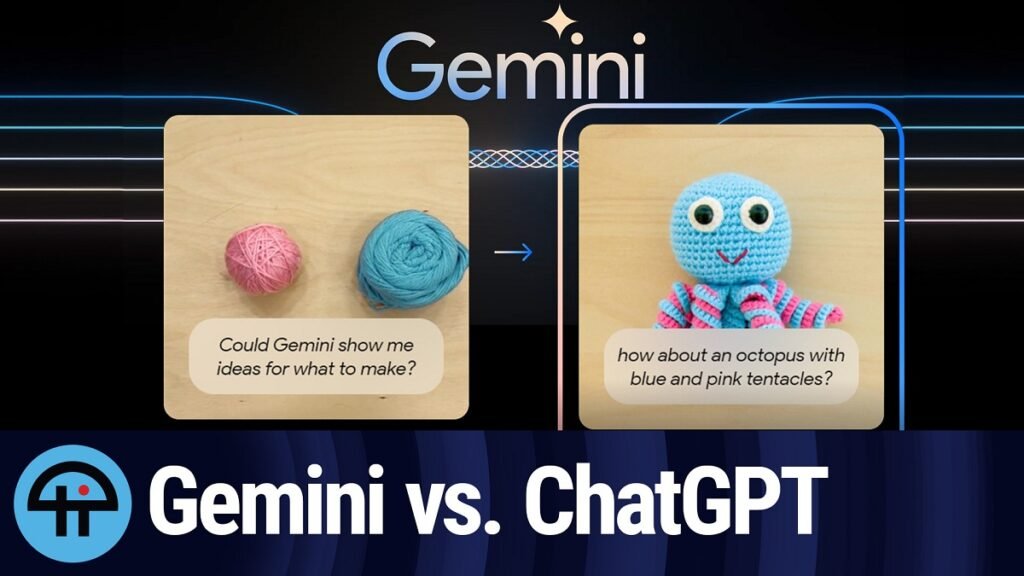Google’s Gemini AI and OpenAI’s ChatGPT are both sophisticated AI language models, each with unique strengths and tailored for different applications. The rivalry between Google’s Gemini AI and ChatGPT has sparked interest, propelling Gemini into the spotlight despite the widespread recognition of ChatGPT.
Gemini, the latest AI language model from Google, is touted to be quicker, more precise, and less resource-intensive than its rivals. A key feature of Gemini is its contextual understanding, allowing it to decipher the implications of words and phrases based on the sentence context.
Conversely, OpenAI’s ChatGPT is a well-recognized AI language model. It has been trained on an extensive dataset of over 8 million web pages and can produce coherent text in response to a provided prompt. Furthermore, ChatGPT is renowned for its ability to generate long-form content, such as essays and articles, in various styles and tones.
In terms of speed and accuracy, Google asserts that Gemini outperforms other AI language models. However, while ChatGPT is also a highly accurate and quick AI language model, it demands more computational resources compared to Gemini.
For tasks necessitating brief, concise responses that are highly context-relevant, Gemini might be the preferred choice. However, if the objective is to generate lengthier, more detailed text that is captivating and creative, ChatGPT could be a more suitable option.
Google reports that its most potent iteration of Gemini AI surpasses ChatGPT in 30 out of 32 scholarly benchmarks. These benchmarks encompass:
- 10 out of 12 text and reasoning benchmarks
- All 9 image comprehension benchmarks
- All 6 video comprehension benchmarks
- All 5 speech recognition benchmarks
Out of the three versions of Gemini (Ultra, Pro, and Nano), Gemini Ultra holds the distinction of being the first AI model to exceed human experts in these benchmark tests. Moreover, it scored an impressive 90% in the Massive Multitask Language Understanding (MMLU), demonstrating its proficiency in understanding a wide range of 57 subjects.
In a comprehensive Massive Multitask Language Understanding (MMLU) test covering 57 subjects across fields such as mathematics, physics, and law, Gemini scored an impressive 90%, surpassing ChatGPT’s 86.4%. However, direct comparisons may be complex due to different evaluation methods: Gemini used the Chain of Thoughts (CoT@32), while ChatGPT employed the 5-shots technique, which could have influenced their final scores. Feel free to share your views on this observation in the comments.
The less powerful Gemini AI Pro model demonstrated encouraging results, outdoing GPT-3.5 (the base LLM for ChatGPT’s free version) in six out of eight tests.
Comparison of Gemini AI with ChatGPT
Gemini AI is emerging as a formidable rival to ChatGPT in the arena of large language models, potentially heralding a paradigm shift.
| Aspect | ChatGPT | Gemini AI |
|---|---|---|
| Availability | OpenAI’s ChatGPT is widely accessible across numerous platforms and APIs, providing free access with basic features and premium paid plans for additional functionalities. | Google’s Gemini AI is currently under development and not yet available to the public. Anticipated to offer various access options, possibly including free access with basic features and tiered paid plans similar to other Google AI services. |
| Ease of Use | With its intuitive interface and simple API, ChatGPT is a favorite among beginners due to its uncomplicated text-based input and output format. | Gemini AI, expected to have advanced features, might necessitate a higher level of technical skill for complex operations. Details about its interface and API, likely involving more complex configurations than ChatGPT, are yet to be revealed. |
| Integration with Services | It integrates smoothly with a variety of platforms such as Discord, Telegram, and web applications, serving a wide range of user communities. | As a newer large language model, Gemini’s integration with existing services may be limited at present. Potential for seamless integration with various Google products and services in the future, leveraging Google’s extensive infrastructure. |
| Accessibility Tools | OpenAI emphasizes inclusivity by offering accessibility features like text-to-speech and speech-to-text options, ensuring its accessibility to users with diverse abilities. | Google’s dedication to accessibility suggests that a variety of accessibility tools could be incorporated upon Gemini’s official launch. Not yet released. |
| Cost | Provides a free tier with limited features, catering to budget-conscious users. Additional functionalities through paid plans. | Pricing structure undisclosed. Expected to align with other Google AI products, possibly offering free access for basic features and tiered paid plans for advanced capabilities. |
Google’s Gemini AI is heightening the competition with ChatGPT, demonstrating superior performance in benchmarks and the potential to revolutionize language models.
While ChatGPT currently enjoys wider accessibility, the forthcoming launch of Gemini aims to make advanced AI more accessible by offering a variety of models tailored to different needs. With its expected seamless integration, Gemini could become the AI of choice for developers and businesses, indicating a possible shift in the balance of AI power.
Naorem Mohen is the Editor of Signpost News. Explore his views and opinion on X: @laimacha.

